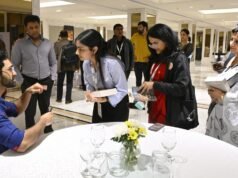Bharatiya Janata Party IT cell chief Amit Malviya on Wednesday accused Congress leader Rahul Gandhi of siding with Ilhan Omar, whom he described as a Pakistan-sponsored anti-India voice.

Amit Malviya’s reaction came a day after the Lok Sabha MP from Uttar Pradesh’s Rae Bareli, while addressing the Indian diaspora in the United States, took a jab at the BJP, saying people are not afraid of the party or Prime Minister Narendra-Modi.
“India’s Leader of Opposition Rahul Gandhi meets Ilhan Omar in the USA, a Pakistan sponsored anti-India voice, a radical Islamist and an advocate of independent Kashmir,” Amit Malviya wrote on X (formerly Twitter).
Malviya added that even Pakistani leaders would be cautious about associating with extreme elements and criticised Congress for allegedly working against India.
Read: Pakistan instigating terrorism in India, not acceptable to us: Rahul Gandhi
“Even Pakistani leaders would be more circumspect about being seen with such rabid elements. Congress is now openly working against India,” the BJP leader added.
Who is Ilhan Omar?
A politically controversial Democratic Congresswoman from Minnesota, Ilhan Omar fled her home country with her family shortly after the outbreak of the Somali Civil War in 1991, spending four years in a Kenyan refugee camp before emigrating to the United States in 1995.
She is the first Somali-American to serve in Congress, as well as the first woman of color to represent Minnesota from 2017 to 2019. She is also known for her anti-India stance and was brutally lambasted for her visit to Pakistan-occupied Kashmir in 2022.
In February 2023, the Republican-controlled House voted to remove Omar from her position on the Foreign Affairs Committee, citing previous remarks she had made about Israel and accusing her of antisemitism.
In June 2022, Omar introduced a resolution in the United States (US) House of Representatives condemning India’s alleged human rights record and ‘violations’ of religious freedom, “including those targeting Muslims, Christians, Sikhs, Dalits, Adivasis and other religious and cultural minorities”.





